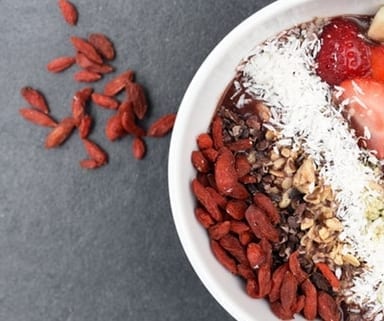Goji Berries – they are those little orange-red coloured berries that are classed as both a fruit and a herb with a natural sweetness and slightly tart aftertaste. Goji berries have been on the Western “Superfood” hit list for a while now, but let’s see what the fuss is all about. It seems that unsurprisingly these little berries have been used since the early days of Chinese Medicine. Across Asia, the berries have been eaten with the intention of boosting longevity and fertility. They are also touted as having natural anti-inflammatory, antibacterial and anti-fungal properties.
There have been claims that these berries can act as a natural remedy for diabetes, hypertension, Malaria or even fevers. Scientific research has not validated these claims as yet, however, this is what we do know; these little berries are a powerhouse of nutritional value. They contain calcium, zinc, selenium and many other trace minerals. They have the highest concentration of iron in any fruit, boasting 15 times more iron than that found in spinach. They are an excellent source of Vitamin C, which we know can reduce cold symptoms by boosting the immune system. As with other berries they are high in beta-carotene which promotes healthy skin and eyes. The tiny edible seeds provide fibre and the berries are considered to be high in antioxidants. As an added bonus they are low in calories and fat-free, this can be beneficial in weight management and digestive regularity.

In fertility circles, it is inferred that the high level of antioxidants found in Goji Berries would enhance sperm count and motility. Antioxidants are also said to protect sperm again free-radical damage whilst preserving the sperm’s DNA, in turn reducing the risk of chromosomal damage or birth defects. Those same antioxidants also serve to protect the testicles and other organs, male and female, involved in the reproductive process. As for women, the berries have been used as an infertility herb and there have been documented instances of conception with the aid of Goji as part of the diet for women with premature ovarian failure in Traditional Chinese Medicine (TCM).
Whilst the list of positive nutrients is long, these berries are not for everyone. If you take blood thinners or diabetic medication you should check with your medical practitioner before adding them to your diet as they could cause a negative reaction.
If they do sound like they are for you then they are incredibly simple to add to your diet regularly. Our acupuncturists and naturopaths recommend having a small handful every day to enhance fertility. You can eat them raw, or soak them in water before snacking away. Pop them in a trail mix or sprinkle them on your morning cereal. Add them to smoothies or use them as a garnish on salads or yogurt dishes. You can even make a fruity tea mix with them. Basically, these berries can be baked, cooked, steamed in a myriad of ways. Get creative or keep it simple to suit your lifestyle!



